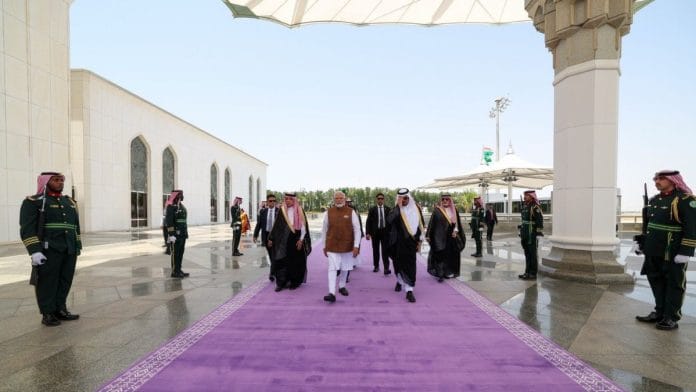New Delhi: Prime Minister Narendra Modi’s aircraft did not fly over Pakistan on his return from Jeddah late Tuesday evening, following his early return to New Delhi due to the terrorist attacks in Kashmir’s Pahalgam.
On his way to Jeddah earlier Tuesday morning, the Prime Minister’s flight flew over Pakistan, as per publicly available data published by Flightradar24, an online real-time flight tracking service. Modi’s plane—Air India One—left New Delhi around 9 am Tuesday and landed in Saudi Arabia approximately five and a half hours later.
In Saudi airspace, the Prime Minister’s aircraft received an escort from the Royal Saudi Air Force in a special gesture. Modi had travelled to Jeddah for what was originally scheduled to be a two-day visit from 22 April to 23 April.
His third visit to the Gulf kingdom was, however, cut short after a group of at least four attackers from the militant outfit Lashkar-e-Taiba, armed with AK-47 rifles, opened fire on tourists in Pahalgam, as reported by ThePrint. At least 26 people were killed, and several others injured. One foreign national, Sudip Neupane from Nepal, was among the deceased.
The attack, which took place while Modi was in Jeddah, prompted the Prime Minister to reschedule his return to New Delhi for late Tuesday evening. During the shortened visit, he held a bilateral meeting with the Crown Prince and Prime Minister of Saudi Arabia, Mohammed bin Salman, and co-chaired the second meeting of the Strategic Partnership Council.
The Indian Prime Minister skipped an official dinner hosted by the Saudi government and departed Jeddah shortly after 11 PM local time, returning to New Delhi early Wednesday morning. On the return leg, Air India One did not traverse Pakistani airspace, according to Flightradar24.
The visit saw the two leaders jointly condemn the Pahalgam attack, declaring in a Joint Statement published Wednesday morning that “there cannot be any justification for any act of terror for any reason whatsoever”.
“They condemned cross-border terrorism, and called on all States to reject the use of terrorism against other countries, dismantle terrorism infrastructure where it exists, and bring perpetrators of terrorism to justice swiftly. Both sides stressed the need to prevent access to weapons including missiles and drones to commit terrorist acts against other countries,” the Joint Statement noted.
The two leaders also agreed to expand the Strategic Partnership Council to include two new committees on defence cooperation and tourism and culture. The Strategic Partnership Council originally consisted of two committees focusing on economy and strategic cooperation.
Saudi Arabia further agreed to establish two refineries in India, while a breakthrough on taxation issues was achieved by the High-Level Task Force on Investment, to promote foreign investment. Riyadh had previously promised investments of up to US$ 100 billion in India in 2019. These investments have yet to materialise.
(Edited by Radifah Kabir)






